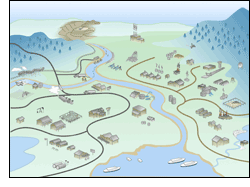Superfund CERCLA:
 The Comprehensive Environmental Response, Compensation, and Liability Act of 1980 (CERCLA) and the subsequent Superfund
Amendments and Reauthorization Act (SARA), which are also referred to as superfund, provide EPA with the authority to
respond to the release or potential release, of hazardous substances. Under CERCLA, tribal entities are essentially
treated the same as states. These hazardous substances, which are defined below, may be of immediate or future risk
to both human and environmental health. CERCLA was essentially established to deal with cases in which the site containing
the hazardous substance is abandoned and the responsible party (owner or operator) or contaminant(s) may not be known.
SARA, among other amendments, increased the fund from $1.5 billion to $8.5 billion per year in order to address cases
in which the responsible party is unknown or unable to pay for required remediation.
The Comprehensive Environmental Response, Compensation, and Liability Act of 1980 (CERCLA) and the subsequent Superfund
Amendments and Reauthorization Act (SARA), which are also referred to as superfund, provide EPA with the authority to
respond to the release or potential release, of hazardous substances. Under CERCLA, tribal entities are essentially
treated the same as states. These hazardous substances, which are defined below, may be of immediate or future risk
to both human and environmental health. CERCLA was essentially established to deal with cases in which the site containing
the hazardous substance is abandoned and the responsible party (owner or operator) or contaminant(s) may not be known.
SARA, among other amendments, increased the fund from $1.5 billion to $8.5 billion per year in order to address cases
in which the responsible party is unknown or unable to pay for required remediation.The law authorizes EPA to respond by means of two approaches: short-term removal and long-term remediation. Short-term removals are classified by an immediate response. Short-term removal actions may include removal of abandoned drums of hazardous substances, spills, and even evacuations. Long-term remediation is aimed at permanently and significantly reducing risks to the surrounding communities and environment. Long-term remediation may be coupled with short-term removal to aid in the remediation process.
Click HERE for the CERCLA cleanup process.
Contaminants of Concern:
Currently about 1,200 substances are listed as hazardous substances under CERCLA. In addition to RCRA defined hazardous wastes, CERCLA hazardous substances also include hazards and toxics defined by:- Clean Air Act (CAA)
- Clean Water Act (CWA)
- Toxic Substance Control Act (TSCA)
CERCLA hazardous substances are listed Table 302.4 in 40 CFR 302.4 [pdf] and are separated by the abovementioned areas. CERCLA hazardous substances also include RCRA defined hazardous wastes, which are designated in the table in 40 CFR 302.4. It should be noted that the Code of Federal Regulations under Title 40 should be investigated for any exceptions and exemptions and for specific information.
Implementing Solutions:
Please submit your experiences (successes/challenges) and tribal-specific documents to share on our website using the attached form.Download Form
Nineteen Navajos graduated, in December 2012, from the Environmental Protection Agency's first Superfund Job Training Initiative program on a tribal nation. The attached article is a summary of three-week federal training program that certified them to handle radioactive waste in contamination cleanups.
Read story [doc]
Superfund Job Training Initiative Brochure:
Download brochure [pdf]
Superfund Redevelopment at EPA helps communities return some of the nation's worst hazardous waste sites to safe and productive uses. In addition to cleaning up these Superfund sites and making them protective of human health and the environment, the Agency is working with communities and other partners in considering future use opportunities and integrating appropriate reuse options into the cleanup process. The Agency is also working with communities at sites that have already been cleaned up to ensure long-term stewardship of site remedies and to promote reuse.
Superfund Redevelopment Brochure:
Download brochure [pdf]
Resources:
CERCLA: The Hazardous Waste Cleanup Program EPA_CERCLA [pdf]CERCLA Orientation Manual [pdf]
This is Superfund: A Community Guide to EPA's Superfund Program [pdf]
Superfund Community Involvement Handbook [pdf]
Additional publications that provide information to community members at Superfund sites can be found on the EPA Superfund Community Involvement Publications website.
For additional resources on this subject, including technical papers, media coverage, brochures, and reports, visit:
TAMS RIC - Resource Information Center
Websites:
EPA's Superfund Website: Cleaning up the Nation's Hazardous Waste Sites:www.epa.gov/superfund/
Superfund Community Involvement Publications (select Community Involvement):
www.epa.gov/superfund
EPA's Contaminated Site Clean-up Information:
www.clu-in.org/
Retrieve Superfund data from the Comprehensive Environmental Response, Compensation, and Liability Information System (CERCLIS) database: www.epa.gov/superfund/superfund-data-and-reports
EPA Superfund Abandoned Mine Lands Information:
www.epa.gov/superfund/abandoned-mine-lands
Related Pages:
BrownfieldsCoal Mining
Contaminated Sites
Federal Facilities
Mining
RCRA vs. CERCLA
Resource Conservation & Recovery Act
For more information, please contact:
Jennifer Williams, Alaska Program Coordinator, Sr.
Tel: 928/523-0673
Email: Jennifer.Williams@nau.edu
Tel: 928/523-0673
Email: Jennifer.Williams@nau.edu
Last updated: July 10, 2015
